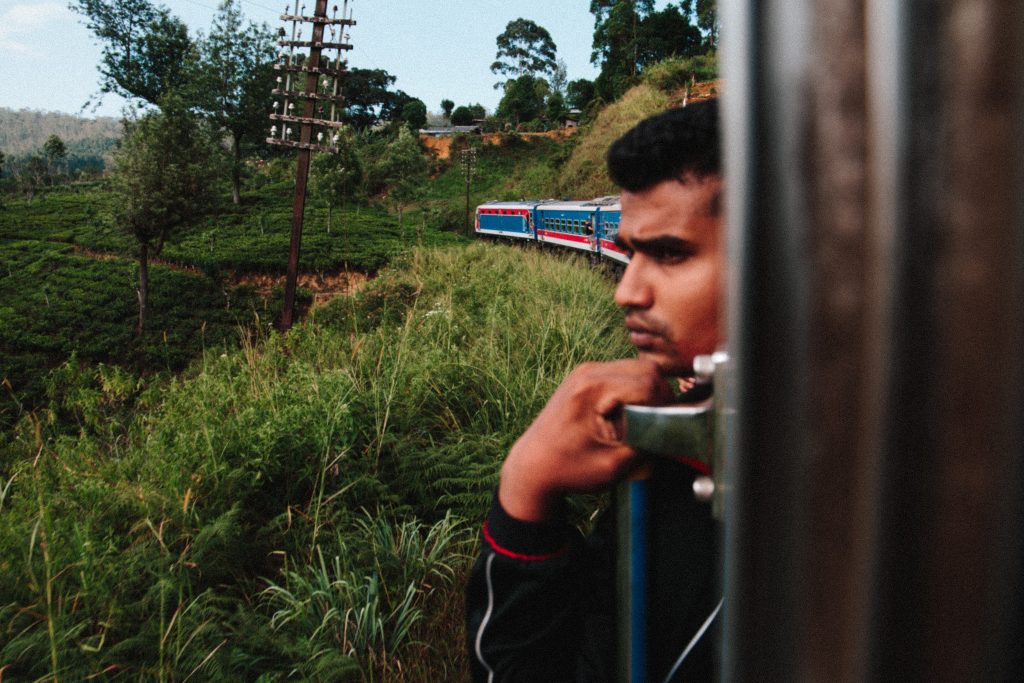
Construire des ponts
Le CECE Équateur encourage la participation d’une manière intelligente
NOTE DU REDACTEUR EN CHEF – Nous avons publié par erreur une version antérieure de cet article qui n’intégrait pas complètement et correctement les dernières contributions du personnel et des étudiants de la CECE. C’est nous qui avons commis cette erreur ; nous nous en excusons et nous regrettons si le contenu a pu causer des inquiétudes ou de la confusion. La version ci-dessous reflète correctement les opinions des membres de la CECE impliqués dans l’article. Nous leur sommes reconnaissants de leur collaboration sur cette édition de Conexión, et nous espérons qu’elle constituera un point de réflexion utile pour l’ensemble de la communauté sur les questions de justice dans votre propre contexte.
Si vous êtes étudiant universitaire en Équateur, vous savez que les conversations sur le campus peuvent être stressantes. Par exemple, un simple commentaire pendant le déjeuner peut se transformer en un vrai débat. D’ailleurs, vous choisiriez souvent de garder le silence pendant que vos camarades de classe expriment leurs opinions sur la situation politique actuelle, car vous savez que prendre la parole ne fera que créer des tensions. En effet, dans un pays historiquement divisé par classe sociale, région, race et religion, la vie est difficile.
Les preuves de divisions sont également disponibles en ligne. Certains étudiants partagent des informations ou des mèmes douteux qui peuvent aliéner leurs pairs qui ne partagent pas leur culture, leurs antécédents ou leur idéologie.
Un Pays Divisé
En octobre 2019, les problèmes de division en Équateur ont atteint un point critique. En effet, suite à la décision du président de supprimer les subventions sur le carburant, qui avaient été mises en place depuis 40 ans, ainsi que de lancer des réformes du travail et des impôts, les manifestants ont envahi les rues. Certains disent que ces manifestations étaient le résultat de centaines d’années d’oppression et de tension entre les classes sociales, les idéologies politiques et les inégalités régionales. Il existe des grandes différences entre la qualité de vie dans les centres urbains et celle dans les zones rurales. Ceux qui vivent dans les zones rurales ont moins accès à des services tels que la santé, l’éducation et la connexion à Internet, tandis que ceux de la ville ont un meilleur accès à ces services de base.
Une autre forme de division est présente au niveau du régionalisme historique entre les provinces côtières et andines du pays. La religion, la race, les politiques d’immigration et l’idéologie politique sont toujours des sujets sensibles sur lesquels les étudiants trouvent difficile de maintenir des conversations respectueuses avec ceux qui ont une vision du monde différente. Pendant les manifestations du mois d’octobre, les étudiants universitaires (y compris ceux du CECE) et les campus ont offert à la fois aux manifestants et à la police de la nourriture, des solutions de garde d’enfants et des soins médicaux. Dans ces moments de conflit, ces gestes sont devenus des ponts.
Participer d’une manière intelligente
Le CECE d’Équateur forme les également les étudiants en leur offrant de outils pratiques pour bâtir des ponts par le dialogue. La directrice nationale du CECE, Ruth Hicks de Olmedo, affirme que de nombreux étudiants n’ont jamais vu des dialogues sains auparavant. Elle nous raconte :
« Les dialogues respectueux ne sont pas quelque chose qui est généralement transmis dans les sphères de la famille, de l’église ou de la politique. Peut-être dans certains espaces académiques, comme les forums, mais certainement pas dans la vie publique. »
Le mouvement équipe les étudiants pour ces types de conversations. Il leur apprend comment aborder des sujets potentiellement divergents de manière réfléchie et respectueuse.
« Nous encourageons les étudiants à utiliser un langage qui encourage le dialogue. Nous voulons qu’ils comprennent l’importance de s’approcher avec une attitude d’écoute et d’apprentissage même s’ils ont déjà un avis clair sur un sujet. Et s’ils n’ont pas d’avis clair, nous les invitons à considérer qu’il est de leur responsabilité de réfléchir et de faire des recherches sur les informations qu’ils partagent – et non pas seulement de transmettre les dernières informations qui apparaissent sur Facebook. »
Le CECE encourage la participation intelligente de plusieurs manières. Le mouvement tient un blog hebdomadaire pour explorer brièvement et attentivement les questions d’actualité d’un point de vue chrétien. Ils ont également organisé des formations pour montrer aux étudiants le lien entre leur foi et leur vie en ligne. Le mouvement promeut également des conversations saines lors de leurs événements locaux et nationaux.
Lors de ces événements, les responsables et les équipiers créent des espaces sûrs pour donner aux étudiants le langage et le cadre nécessaires pour discuter sur des sujets potentiellement polémiques. Un de ces événements est le camp national annuel, qui rassemble des étudiants de tout le pays. Ruth raconte qu’au début du camp, il y a des étudiants qui ont peur de se mêler à des personnes extérieures à leur groupe.
“Nous avons des étudiants qui, en arrivant, disent n’avoir jamais parlé à quelqu’un venant d’une province différente. Après avoir appris à se connaître, ils se disent : « C’est vrai qu’ils sont assez différents de moi, mais c’était super de les connaître. Maintenant, ils sont mes amis ! »
En mettant en pratique les conseils pour des dialogues constructifs, les étudiants peuvent aborder le camp avec une attitude d’écoute et d’apprentissage envers ceux qui possèdent des avis différents. Au fil des jours, ils sont surpris de constater qu’il n’était pas si difficile de se faire de nouveaux amis.
Comprendre l’injustice
Lorsqu’ils sont bien équipés pour participer aux dialogues, les étudiants peuvent devenir plus sensibles aux injustices qui les entourent. Plus récemment, les discussions sur les conséquences du coronavirus ont mis en évidence les inégalités existantes au sein de la société, en particulier entre les races et les régions. Ces inégalités sont également évidentes dans le contexte universitaire. Par exemple, les cours en ligne ont été attendus pendant des mois par des nombreux étudiants des universités publiques, alors que les universités privées de la ville les ont mis à disposition en quelques semaines. Plusieurs étudiants des zones rurales n’avaient même pas d’Internet ni d’équipement technique pour participer à des cours en ligne. Il y a aussi de nombreux étudiants qui ont dû réduire les cours suivis ou se retirer des universités privées en raison de la situation économique.
Beaucoup de ces étudiants sont originaires de familles qui dépendent de leurs ventes quotidiennes des produits sur les marchés locaux. Comme ces marchés ont été fermés pendant le confinement, les familles ont été contraintes de trouver des endroits alternatifs afin de vendre leurs marchandises. La prise de conscience de problèmes comme celui-ci, suivi des manifestations d’octobre, a aidé les étudiants à comprendre leur lien avec des problèmes systémiques profondément enracinés.
Saisir l’opportunité d’apprendre
En fin de compte, le CECE encourage le dialogue constructif parce qu’il croit que cela glorifie Dieu. Andrea Utreras, membre du personnel, affirme que la construction de ponts permet aux étudiants d’avoir une vue d’ensemble.
« Jésus appelle chaque tribu, chaque langue et chaque nation. Il appelle tout le monde. Et nous devons être unis en lui. Nous sommes également appelés à aimer les personnes, cela veut dire, aimer ceux qui sont différents. Les aimer comme une personne à part entière, et pas seulement parce qu’ils partagent notre foi. »
Alors qu’ils encouragent les étudiants à participer intelligemment, Andrea dit toujours aux étudiants d’être prêts à grandir.
« Vous découvrirez que vous n’avez peut-être pas du tout raison. Soyez prêts à être mis au défi. Soyez prêts à en savoir plus ou à demander à une autre personne. N’ayez pas peur de dire « je ne sais pas. Cela arrive et c’est très bien. Car c’est une chance d’apprendre. »
Quels problèmes de division découragent l’unité sur votre campus ? Que pouvez-vous faire pour construire des ponts entre vous et ceux qui ne sont pas d’accord avec vous ?
Related Posts

L’agriculture en action
Comment FOCUS Zimbabwe utilise les poulets pour payer l’éducation
Justice dans le monde
Une nouvelle série de blogs de Conexión de l’IFES
S’impliquer pour voir un changement dans la société
La réaction des étudiants face aux suicides au Sri Lanka
Faire de la place
Comment l’écoute conduit à apprendre de ceux qui sont différents





